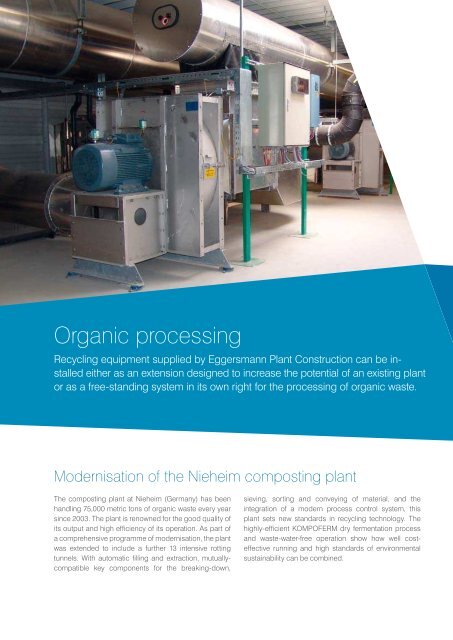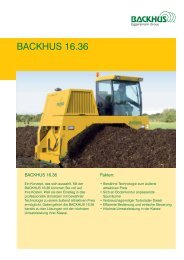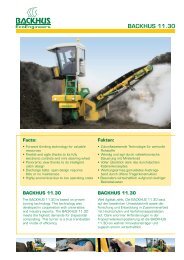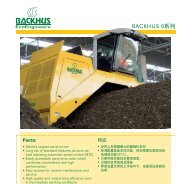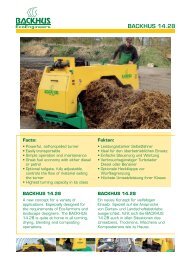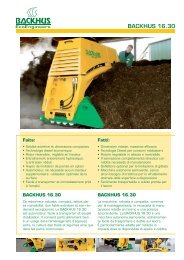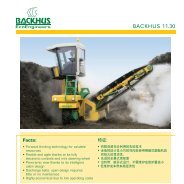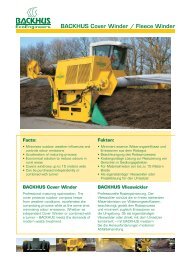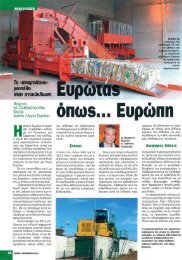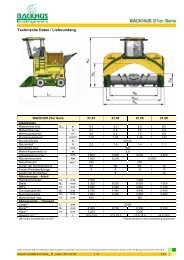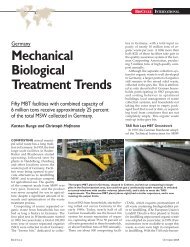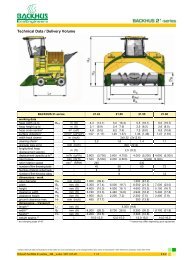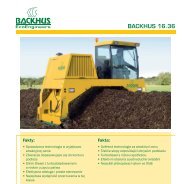Shaping the future - Eggersmann Gruppe
Shaping the future - Eggersmann Gruppe
Shaping the future - Eggersmann Gruppe
Create successful ePaper yourself
Turn your PDF publications into a flip-book with our unique Google optimized e-Paper software.
Organic processing<br />
Recycling equipment supplied by <strong>Eggersmann</strong> Plant Construction can be installed<br />
ei<strong>the</strong>r as an extension designed to increase <strong>the</strong> potential of an existing plant<br />
or as a free-standing system in its own right for <strong>the</strong> processing of organic waste.<br />
Modernisation of <strong>the</strong> Nieheim composting plant<br />
The composting plant at Nieheim (Germany) has been<br />
handling 75,000 metric tons of organic waste every year<br />
since 2003. The plant is renowned for <strong>the</strong> good quality of<br />
its output and high efficiency of its operation. As part of<br />
a comprehensive programme of modernisation, <strong>the</strong> plant<br />
was extended to include a fur<strong>the</strong>r 13 intensive rotting<br />
tunnels. With automatic filling and extraction, mutually-<br />
compatible key components for <strong>the</strong> breaking-down,<br />
sieving, sorting and conveying of material, and <strong>the</strong><br />
integration of a modern process control system, this<br />
plant sets new standards in recycling technology. The<br />
highly-efficient KOMPOFERM dry fermentation process<br />
and waste-water-free operation show how well cost-<br />
effective running and high standards of environmental<br />
sustainability can be combined.<br />
Pohlsche Heide<br />
The 16 tunnels of this intensive composting<br />
system with additional partial-flow<br />
fermentation at <strong>the</strong> Pohlsche Heide<br />
recycling plant in Minden (Germany)<br />
went successfully into operation in<br />
2005. This turnkey system was<br />
designed to allow <strong>the</strong> addition of a<br />
fur<strong>the</strong>r seven tunnels to increase<br />
capacity. The plant handles up to<br />
120,000 Mg of household waste<br />
every year, with 60,000 Mg of<br />
biomass going annually to <strong>the</strong><br />
tunnel composting system.<br />
<strong>Eggersmann</strong> Plant Construction<br />
carried out all <strong>the</strong> installation<br />
and setup work, in addition<br />
to <strong>the</strong> corresponding<br />
structural planning<br />
and completion tasks, for<br />
this truly state-of-<strong>the</strong>-art<br />
processing plant.<br />
With 32 tunnel units for <strong>the</strong> intensive rotting<br />
and post-rotting process, plus a line composting<br />
system in section II, <strong>the</strong> mechanical<br />
treatment system used in <strong>the</strong> production of<br />
secondary fuels at <strong>the</strong> Ennigerloh (Germany)<br />
waste-disposal plant has taken organic<br />
recovery processes to a new level. In accordance<br />
with article 30 of <strong>the</strong> corresponding<br />
German environmental legislation<br />
(BImSchV), this ultra-modern plant had to<br />
include a material stabilisation system and<br />
<strong>the</strong> production of reusable organic material<br />
in order to comply with <strong>the</strong> relevant regu-<br />
lations covering waste disposal (AbfAblV).<br />
The various parts of <strong>the</strong> tunnel composting<br />
system, all of which are designed to run<br />
smoothly with each o<strong>the</strong>r, are integrated<br />
into an automated process-monitoring and<br />
control system. This permits fully-automatic<br />
control of <strong>the</strong> inputs and outputs of <strong>the</strong><br />
tunnel. The range of available systems includes<br />
exhaust-air treatment by means<br />
of bio-filters and regenerative <strong>the</strong>rmal<br />
oxidation RTO, along with complete water<br />
management. The plant system, with its<br />
related buildings and external infrastructure,<br />
went into operation in 2005.


